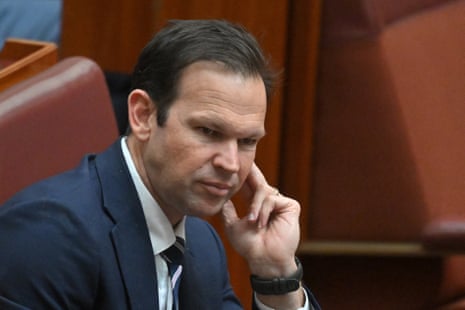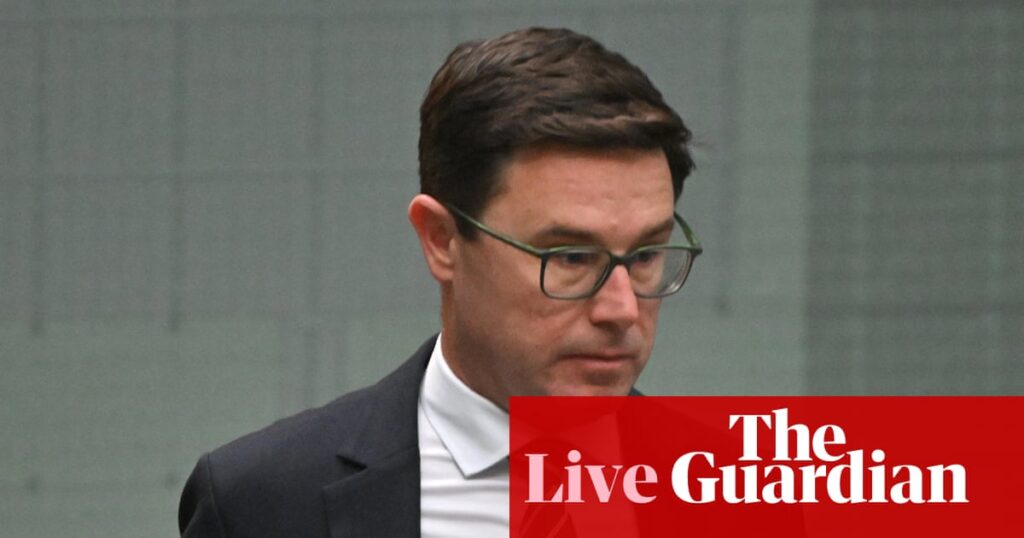Nationals expected to formalise net zero position at party room meeting

Krishani Dhanji
The Nationals are holding a special party room meeting this morning, after the party’s federal council yesterday removed support for net zero from their federal platform.
Senators Matt Canavan and Ross Cadell, who were charged with reviewing the Nat’s energy and net zero policy, are expected to put forward their review to the party room this morning for debate.

We’ve been told this morning it could take about two hours, and there’s an expectation from some who will be in the room that there will be a policy position decided today.
A bitter brawl had erupted between the Liberal and National parties – and conservative and moderate factions – about whether to keep the net zero target, prompting speculation the Coalition could split.
The issue has led to Barnaby Joyce leaving the Nationals party room, but party leader David Littleproud confirmed on Saturday that Joyce was still a member of the party and was welcome to return to the party room.
You can catch up on the background to today’s meeting here:
Key events
Asked if he wanted native forest logging to continue (it’s not banned in the legislation, despite the significant negative environmental impact that it has), Watt dodges the question by saying the party doesn’t have a specific policy of ending native forest logging.
He continued:
What we have said, though, is that we will follow the recommendation from Graeme Samuel to apply national environmental standards to the regional forestry agreements that are used for native forestry, so what that means in practice is that native forestry would need to meet higher environmental standards than are currently required under the legislation. That’s a big step forward in terms of the environmental management of native forestry. But it doesn’t go as far as what the Greens party is seeking in being an all-out ban.
Watt admitted there’s nothing in the proposed legislation to stop a coal or a gas project going ahead:
Not in its own right. We haven’t taken the approach of saying that particular projects are altogether banned. Every project will be assessed on its merits whether it be a coal and gas project, whether it be a housing and renewable project, they have all got to demonstrate they’re not having a significant impact on one of the nine matters of national environmental significance under the Act.
The legislation wouldn’t alter “whether a project can or can’t go ahead” but rather determines a criteria to be used to decide if a project should go ahead, he said.
Watt continued:
If a coal or gas development was seeking approval, then it would need to meet the national environmental standards. It would need to avoid and minimise its environmental impacts and offset them to achieve a net gain. So they would be improvements compared to the criteria that apply to a project at the moment. If it was considered to have an unacceptable impact on the environment then it would get knocked back as would a housing development or a renewable project.
We’re not trying to sort of put in particular criteria for particular sectors. What we’re trying to do is put in a balanced package for all sorts of projects, for all industries, that deliver environmental and business gains.
Murray Watt defends overhaul of environmental laws
The federal environment minister, Murray Watt, has been defending his current overhaul of environmental laws, including the powers of the minister to still approve projects going ahead on grounds of national interest – even if they are deemed too damaging to the environment.
Watt has been speaking to ABC TV’s Insiders program this morning. He claimed the new laws would provide more clarity than the current legislation on what would be an unacceptable impact on the environment. He said:
Under the current legislation, a minister can knock back a project if it’s going to be clearly unacceptable, but there’s no definition of what that means in the current legislation.
What we’re seeking to do through these reforms is actually provide a definition of what would be considered an unacceptable impact on the environment and would therefore would get a no. The sort of things we’re talking about in that definition are, for example, if something was going to seriously impair or have irreplaceable damage to a particular environmental matter, and some of the examples I have given have been if, perish the thought, if someone wanted to mine Uluru, build on the Great Barrier Reef, or drive a species to extinction. I think most Australians would say that kind of project wouldn’t proceed.
Just to clarify on that earlier Medicare post: the announcement relates to Labor’s $8.5bn election promise to increase bulk billing coming into effect. It was not a new announcement or new funds.

Nino Bucci
Australia needs a national definition of hate crime, experts say
Hate crimes have long been debated in Australia, but the war in Gaza and the rise in reports of antisemitism and Islamophobia have thrust the laws designed to punish these crimes into the political spotlight.
The Australian federal police commissioner, Krissy Barrett, has gone as far as saying new national hate crime laws may need to be strengthened.
So how many of these crimes have resulted in police charges across Australia? And how differently is a report of a hate crime treated in each jurisdiction?
In the wake of governments passing new laws – along with concerns about the accuracy of data about antisemitic incidents reported by New South Wales police and some states taking new approaches to the issue – Guardian Australia set out to explore hate crime.
The picture that emerged was complex.
Read the full story from me and my colleague Adeshola Ore:
Health minister says bulk-billing expansion will benefit ‘every electorate in the country’
A new $8.5bn injection of funds into Medicare will mean “every electorate in the country will now have GP practices that bulk bill every patient,” the health minister, Mark Butler has said.
The new funding announcement from the federal government will expand bulk-billing incentives for GPs, which is an additional payment on Medicare benefits that is paid to the GP and the practice to encourage them to bulk bill patients.
The incentive has previously only been available for bulk-billing children under 16 and concession card holders. The expansion of the scheme will mean GPs and practices will receive the incentive payment for every patient they bulk bill.
The government claims this will result in an additional 18m bulk-billed GP visits annually, and that nine out of 10 GP visits will be bulk billed by 2030.
Butler said in a statement this morning:
I want every Australian to know they only need their Medicare card, not their credit card, to receive the health care they need.
Every electorate in the country will now have GP practices that bulk bill every patient.
Nationals expected to formalise net zero position at party room meeting

Krishani Dhanji
The Nationals are holding a special party room meeting this morning, after the party’s federal council yesterday removed support for net zero from their federal platform.
Senators Matt Canavan and Ross Cadell, who were charged with reviewing the Nat’s energy and net zero policy, are expected to put forward their review to the party room this morning for debate.
We’ve been told this morning it could take about two hours, and there’s an expectation from some who will be in the room that there will be a policy position decided today.
A bitter brawl had erupted between the Liberal and National parties – and conservative and moderate factions – about whether to keep the net zero target, prompting speculation the Coalition could split.
The issue has led to Barnaby Joyce leaving the Nationals party room, but party leader David Littleproud confirmed on Saturday that Joyce was still a member of the party and was welcome to return to the party room.
You can catch up on the background to today’s meeting here:
Albanese praises Apec’s opportunities for ‘informal dialogue’
The prime minister, Anthony Albanese, has said he’d like to see “more cooperation” between China and the United States on artificial intelligence, but felt that the meeting between President Donald Trump and President Xi Jinping in Korea this week was “an important step forward”.
The leaders are in Gyeongju for the Apec summit, where Albanese has also met with the new Japanese prime minister, Takaichi Sanae, and the new prime minister of Thailand, Anutin Charnvirakul.
Albanese said he personally had “four or five interactions” with President Xi and “multiple interactions with President Trump as well”, including last week’s informal dinner.
I quite enjoy the informal dialogue as well … the informal dinner, of course, that occurred here with President Trump, that was a couple of hours of informal discussion. That’s how you build relationships. It’s the formal meetings where there are bilats and people take notes and I report to you what is said, and then there is just engagement with people.
On AI, Albanese said Xi and Trump had “agreed to dialogue next year”:
It is in the world’s interest for the world’s two largest economies and powers to engage with each other constructively. What they do has an impact right around the world. We live in an interconnected world. The comment was made by a few people over recent days about the impact of the Russian invasion of Ukraine had an impact on supermarket shelves in Chile, in Mexico as well as in Australia.
So, we need to encourage cooperation as much as possible across the board. It’s what Australia does, and it’s what we want to see more of. And I think there’s been some positive steps forward this week.
More rain on horizon after severe storms and giant hail in Queensland and NSW
Millions of people have potentially seen the worst of a weekend of wild weather after giant hailstones, rain and destructive winds pummelled parts of Australia’s east, AAP reports.
Bands of thunderstorms lashed a region stretching from central Queensland down to northern NSW on Saturday, drenching Brisbane and the Sunshine and Gold Coasts as they moved east, with the Bureau of Meteorology issuing alerts well into the night.
There were reports of shattered car windows and damaged homes in some areas as the storms brought hailstones up to 9cm wide and gusts up to 100km/h, while thousands of homes were left without power.
Several people were treated after being hit by hailstones, according the media reports.
In NSW, parts of the Hunter, mid-north coast, and central tablelands on Saturday recorded hailstones as large as 7cm, while Grafton in the northern rivers region received 70mm of rain in half an hour.
Though storms are set to continue today, they are expected to be contained to a smaller area.
“Many places will not see the same risk,” BoM forecaster Angus Hines said. “But that doesn’t mean there’s no risk at all.”
There was a chance severe thunderstorms would continue to plague the sunshine state, but they were expected to affect areas from Brisbane to Bundaberg, Hines said.
Welcome
Good morning and welcome to your Sunday live news blog. My name is Stephanie Convery and I’ll be with you for much of today, bringing you all the latest news updates as they happen.
First up, the prime minister, Anthony Albanese, has said he wants to see more cooperation between the United States and China after diplomatic meetings between President Donald Trump and President Xi Jinping at the Apec summit in South Korea this week. More on those comments in a moment.
Back at home, and the federal health minister, Mark Butler, has announced an $8.5bn investment in Medicare, which expands the bulk-billing incentive payments to GPs, which the government says will make bulk billing available to more patients – up to 18m additional bulk-billed GP visits every year.
And the Nationals have a party room meeting this morning, where they are expected to formalise their net zero position after voting to abandon the commitment yesterday.
Grab a coffee and get settled: there’s all that and more to come very shortly.

